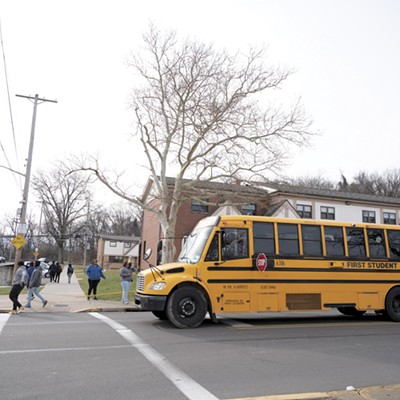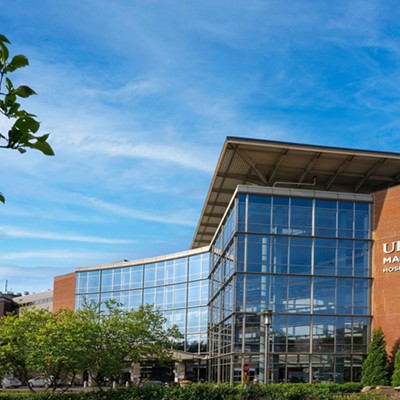This new Pittsburgher is challenging what it means to be an undocumented immigrant in America
In many ways, Topiltzin Gomez and his family's story is not unique. They crossed the U.S.-Mexico border illegally in 2002 for better economic opportunity and better education, connected with family already living in the states, and did their best to make a new life here under the strain of living undocumented.
Gomez, who lives in Shadyside, went on to attend public school near Chicago, graduate from Yale University, intern at Google, qualify for Deferred Action for Childhood Arrivals (DACA), and now works at the Pittsburgh crowdfunding program Honeycomb. But Gomez is not resting on his laurels. Instead, he's choosing to use his success to lift up other undocumented people who don't have the security and job prospects he now enjoys.
“Me and my brother have always been super open about our [undocumented] status,” says Gomez, whose brother Irvin is also undocumented and has seen educational and career success. “We know there are peers below us looking up to us. … These people are people, and we should love them. And we need to talk about them to unlock the value of these people and not just in an economic way, in an emotional way.”
Gomez, whose friends call him TP, was born and spent his young childhood in the Mexican state of Oaxaca. His mother was a school teacher and his father worked odd jobs and construction work. It wasn’t a life of despair, but not quite one of luxury either. Gomez describes it as “solidly lower middle class.”
With his mother being a school teacher, the family put a lot of value on education, and both Gomez and his brother Irvin attended private Catholic school. But he says Oaxaca is one of the poorest states in Mexico, and the local education system experienced constant teachers’ strikes and rampant nepotism.
So, when Gomez was 5 years old, the family decided to try immigrating to America. Most of his family on his father’s side was from a rural village on the Oaxacan coast, and many of them had already immigrated to the Chicago area. Thus, Gomez and his family made the journey from his Southern Mexican state to the border, where he and his brother were brought across at Douglas, Ariz., by a “coyote,” a person paid to transport immigrants over the border illegally. Gomez’s parents crossed a bit later, his mom without detection, but his father was caught once or twice.
His dad later told Gomez that getting caught wasn’t going to stop him from rejoining his family. “I got all three of my family members there, I have to go,” Gomez recalls his father saying.
After his father made it across successfully, the family moved to Waukegan, Ill., a suburb of Chicago where many of Gomez’s family members had already lived. Waukegan is a post-industrial city where the largest share of its residents are Latino.
When in Waukegan, Gomez and his brother picked up where they left off in Oaxaca. He says he entered the public school system and his parents continued their emphasis on education. He started in English as a Second Language class and was speaking English fluently by third grade.
“The big contributor was my parents’ dedication to education,” says Gomez.
During his childhood, Gomez’s mother worked at Marshalls department store and his father worked as a busboy. His dad would wake up at 3:30 a.m. to drive his mom and aunt to their shift, and then work double shifts at an area restaurant. Eventually, a factory owner that knew Gomez’s uncle noticed his father’s work ethic and offered him a job at the factory.
“That is how we were able to get into steady, and non-exploitative, employment,” says Gomez, as his mother also joined his father at the factory, which put labels on several consumer items.
Through all this, Gomez and his brother continued their education, even in a poorly performing school district. Gomez says his teachers were dedicated, however, and Irvin was able to get into summer programs and eventually got accepted at Dartmouth.
Gomez says he learned from Irvin, who was very successful in school, but still found roadblocks that come along with not having a social security number and thus couldn’t apply to available grants.
“I learned from my older brother’s example,” says Gomez. “He began to tackle the ramifications of being undocumented.”
Eventually, both qualified for DACA, which gave them the opportunity to participate in more programs and find jobs. Gomez says DACA is still a bit exclusionary to some immigrants, but it has been a game-changer for him and his brother.
In 2017, President Donald Trump challenged the DACA rule, which was created under President Barack Obama, and an upcoming Supreme Court ruling could end the program. Trump's immigration enforcement has also been extremely aggressive, including detaining and deporting immigrants without local criminal records.
Trump’s administration has also instituted several restrictions on immigration from Central American countries and Mexico, including further limiting asylum claims. Under current immigration rules, it is virtually impossible for lower-income people from Mexico and Central America to immigrate to the U.S. legally. Family-based immigration is limited to certain members; employment-based rules require immigrants to already have a job lined up; and backlogs for those very few who do qualify can take several years, even decades.
Both Gomez brothers were also fortunate enough to receive the Schuler Scholar Program, an Illinois-based nonprofit that partners with mostly first-generation students, students of color, and low-income students to help send them to prestigious universities.
And when Irvin got into Dartmouth, Gomez knew he could do similar. Eventually, he was accepted at Yale, where he said he felt the pull of two paths. The ivory tower institution provided a path of economic study, but the New Haven community surrounding it also showcased a strong immigrant community that is fighting for political power.
Seeing how the New Haven immigrant community held sway in the town’s politics made Gomez wonder why that same power wasn’t building in Waukegan. This American experience helped guide him to the work he is doing today in Pittsburgh. He even turned down a job at Google after interning there, instead choosing to focus his career on helping to uplift Rust Belt communities that typically lack access to institutional benefits.
Gomez has lived in Shadyside for two years. Pittsburgh has one of the lowest amount of undocumented immigrants of any U.S. metro area, and also a very small Latino population, but Gomez says his time in New Haven showed how even small immigrant communities can take up space in any area. He has made relationships with local Latino groups like the Pittsburgh Hispanic Development Corporation and is confident about Pittsburgh’s improving its relationship with new immigrants.
“I think being in Pittsburgh, if I hadn’t gone through what I did in New Haven, Pittsburgh would have been a much more lonely place,” says Gomez. “I would not have been able to walk some streets, and feel welcome.”
Gomez knows immigrants can play a powerful role in the American economy beyond taking low-wage jobs at restaurants and farms. His brother Irvin, for example, is now a consultant at a Fortune 500 company. Some of his family members back home are moving to Louisville to start home-cleaning and landscaping companies because they have realized a shortage of those businesses there.
“A lot of the family has gone from wage earners to looking into entrepreneurship,” says Gomez.
In Waukegan, which suffered from industrial decline like many Rust Belt cities, immigrants have opened up storefronts in long-vacant buildings.
“We saw that in my hometown, the factory jobs left, but the immigrants come in and a whole new business district opens up,” says Gomez.
This is the future Gomez is holding to build while working in Pittsburgh. He recognizes entrepreneurship isn't a panacea for the Rust Belt, but he thinks it is a better path forward than throwing tax subsidies at giants like Amazon.
Gomez is excited to help start a Honeycomb platform in Baltimore and Philadelphia, and he hopes it will help immigrant, Black, and under-served communities in those areas find access to some capital.
“I wanted it to be in the Rust Belt, that is where I grew up. There is so much potential here, you can rewrite the script,” says Gomez. He adds that he is not alone. He knows the undocumented community in Waukegan is still struggling economically and with educational attainment at times, but there are other young immigrants forging their own unique American path.
“All of my friends, that peer group, that have the same status, they are doing cool things too,” says Gomez. “And it's thanks to the older generation. They risked everything.”
Gomez, who lives in Shadyside, went on to attend public school near Chicago, graduate from Yale University, intern at Google, qualify for Deferred Action for Childhood Arrivals (DACA), and now works at the Pittsburgh crowdfunding program Honeycomb. But Gomez is not resting on his laurels. Instead, he's choosing to use his success to lift up other undocumented people who don't have the security and job prospects he now enjoys.
“Me and my brother have always been super open about our [undocumented] status,” says Gomez, whose brother Irvin is also undocumented and has seen educational and career success. “We know there are peers below us looking up to us. … These people are people, and we should love them. And we need to talk about them to unlock the value of these people and not just in an economic way, in an emotional way.”
Gomez, whose friends call him TP, was born and spent his young childhood in the Mexican state of Oaxaca. His mother was a school teacher and his father worked odd jobs and construction work. It wasn’t a life of despair, but not quite one of luxury either. Gomez describes it as “solidly lower middle class.”
With his mother being a school teacher, the family put a lot of value on education, and both Gomez and his brother Irvin attended private Catholic school. But he says Oaxaca is one of the poorest states in Mexico, and the local education system experienced constant teachers’ strikes and rampant nepotism.
So, when Gomez was 5 years old, the family decided to try immigrating to America. Most of his family on his father’s side was from a rural village on the Oaxacan coast, and many of them had already immigrated to the Chicago area. Thus, Gomez and his family made the journey from his Southern Mexican state to the border, where he and his brother were brought across at Douglas, Ariz., by a “coyote,” a person paid to transport immigrants over the border illegally. Gomez’s parents crossed a bit later, his mom without detection, but his father was caught once or twice.
His dad later told Gomez that getting caught wasn’t going to stop him from rejoining his family. “I got all three of my family members there, I have to go,” Gomez recalls his father saying.
After his father made it across successfully, the family moved to Waukegan, Ill., a suburb of Chicago where many of Gomez’s family members had already lived. Waukegan is a post-industrial city where the largest share of its residents are Latino.
When in Waukegan, Gomez and his brother picked up where they left off in Oaxaca. He says he entered the public school system and his parents continued their emphasis on education. He started in English as a Second Language class and was speaking English fluently by third grade.
“The big contributor was my parents’ dedication to education,” says Gomez.
During his childhood, Gomez’s mother worked at Marshalls department store and his father worked as a busboy. His dad would wake up at 3:30 a.m. to drive his mom and aunt to their shift, and then work double shifts at an area restaurant. Eventually, a factory owner that knew Gomez’s uncle noticed his father’s work ethic and offered him a job at the factory.
“That is how we were able to get into steady, and non-exploitative, employment,” says Gomez, as his mother also joined his father at the factory, which put labels on several consumer items.
Through all this, Gomez and his brother continued their education, even in a poorly performing school district. Gomez says his teachers were dedicated, however, and Irvin was able to get into summer programs and eventually got accepted at Dartmouth.
Gomez says he learned from Irvin, who was very successful in school, but still found roadblocks that come along with not having a social security number and thus couldn’t apply to available grants.
“I learned from my older brother’s example,” says Gomez. “He began to tackle the ramifications of being undocumented.”
Eventually, both qualified for DACA, which gave them the opportunity to participate in more programs and find jobs. Gomez says DACA is still a bit exclusionary to some immigrants, but it has been a game-changer for him and his brother.
In 2017, President Donald Trump challenged the DACA rule, which was created under President Barack Obama, and an upcoming Supreme Court ruling could end the program. Trump's immigration enforcement has also been extremely aggressive, including detaining and deporting immigrants without local criminal records.
Trump’s administration has also instituted several restrictions on immigration from Central American countries and Mexico, including further limiting asylum claims. Under current immigration rules, it is virtually impossible for lower-income people from Mexico and Central America to immigrate to the U.S. legally. Family-based immigration is limited to certain members; employment-based rules require immigrants to already have a job lined up; and backlogs for those very few who do qualify can take several years, even decades.
Both Gomez brothers were also fortunate enough to receive the Schuler Scholar Program, an Illinois-based nonprofit that partners with mostly first-generation students, students of color, and low-income students to help send them to prestigious universities.
And when Irvin got into Dartmouth, Gomez knew he could do similar. Eventually, he was accepted at Yale, where he said he felt the pull of two paths. The ivory tower institution provided a path of economic study, but the New Haven community surrounding it also showcased a strong immigrant community that is fighting for political power.
Seeing how the New Haven immigrant community held sway in the town’s politics made Gomez wonder why that same power wasn’t building in Waukegan. This American experience helped guide him to the work he is doing today in Pittsburgh. He even turned down a job at Google after interning there, instead choosing to focus his career on helping to uplift Rust Belt communities that typically lack access to institutional benefits.
Gomez has lived in Shadyside for two years. Pittsburgh has one of the lowest amount of undocumented immigrants of any U.S. metro area, and also a very small Latino population, but Gomez says his time in New Haven showed how even small immigrant communities can take up space in any area. He has made relationships with local Latino groups like the Pittsburgh Hispanic Development Corporation and is confident about Pittsburgh’s improving its relationship with new immigrants.
“I think being in Pittsburgh, if I hadn’t gone through what I did in New Haven, Pittsburgh would have been a much more lonely place,” says Gomez. “I would not have been able to walk some streets, and feel welcome.”
Gomez knows immigrants can play a powerful role in the American economy beyond taking low-wage jobs at restaurants and farms. His brother Irvin, for example, is now a consultant at a Fortune 500 company. Some of his family members back home are moving to Louisville to start home-cleaning and landscaping companies because they have realized a shortage of those businesses there.
“A lot of the family has gone from wage earners to looking into entrepreneurship,” says Gomez.
In Waukegan, which suffered from industrial decline like many Rust Belt cities, immigrants have opened up storefronts in long-vacant buildings.
“We saw that in my hometown, the factory jobs left, but the immigrants come in and a whole new business district opens up,” says Gomez.
This is the future Gomez is holding to build while working in Pittsburgh. He recognizes entrepreneurship isn't a panacea for the Rust Belt, but he thinks it is a better path forward than throwing tax subsidies at giants like Amazon.
Gomez is excited to help start a Honeycomb platform in Baltimore and Philadelphia, and he hopes it will help immigrant, Black, and under-served communities in those areas find access to some capital.
“I wanted it to be in the Rust Belt, that is where I grew up. There is so much potential here, you can rewrite the script,” says Gomez. He adds that he is not alone. He knows the undocumented community in Waukegan is still struggling economically and with educational attainment at times, but there are other young immigrants forging their own unique American path.
“All of my friends, that peer group, that have the same status, they are doing cool things too,” says Gomez. “And it's thanks to the older generation. They risked everything.”


















